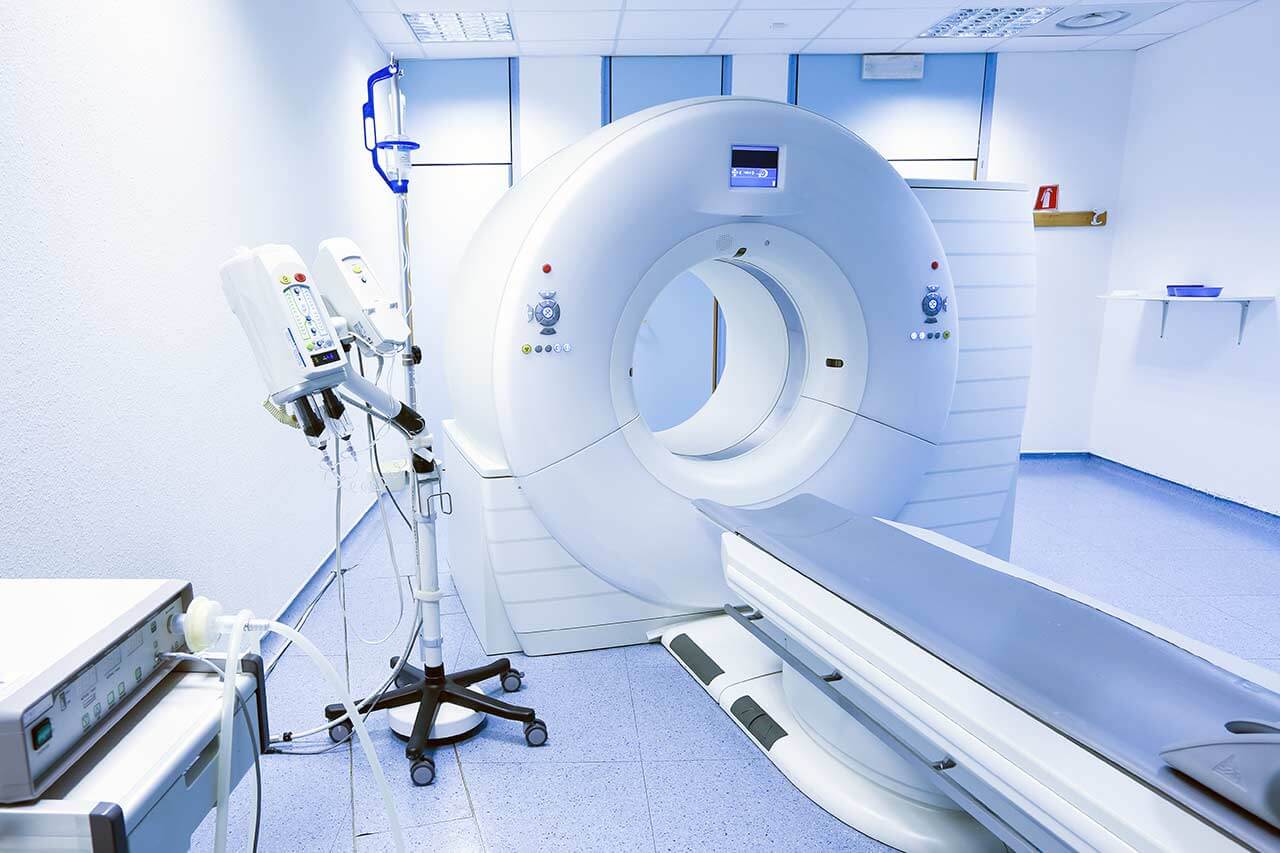
The program includes:
- Initial presentation in the clinic
- clinical history taking
- review of medical records
- physical examination
- laboratory tests:
- complete blood count
- biochemical analysis of blood
- inflammation indicators (CRP, ESR)
- TSH-basal, fT3, fT4
- indicators of blood coagulation
- CT planning of radiation therapy
- full course of conventional radiation therapy
- symptomatic treatment
- cost of essential medicines and materials
- nursing services
- control examinations
- consultations of related specialists
How program is carried out
During the first visit, the doctor will conduct a clinical examination and go through the results of previous laboratory tests and instrumental examinations. After that, you will undergo an additional examination, including complete blood count, laboratory assessment of liver and kidney function. Based on the received results, the physician will conduct radiotherapy planning with the help of CT or MRI, make the permanent tattoo marks on the skin and conduct CT simulation in order to assess the accuracy of the rays and the radiation dose. If necessary, related medical specialists will be involved in the elaboration of a treatment regimen (tumor board).
Radiation therapy is carried out as the day hospital procedure, without mandatory admission to the hospital. At each visit, the physician will assess your general condition and the marks on the skin. After that, you will be placed in a shielded radiation therapy room, on a special table.
Each radiation therapy session lasts less than half an hour (including preparation). All this time, doctors and nurses are monitoring your condition, you can communicate with them through a loudspeaker. The procedure is completely painless. Depending on the planned course of treatment, you will visit the hospital from 1 to 3-5 times a week.
After the completion of the radiation therapy course, you will undergo control examinations aimed at assessing your condition and efficacy of treatment. After that you will receive the medical report with detailed recommendations regarding further follow-up and treatment. In the future, you will be able to have a distant consultation with your attending physician and schedule the next course of treatment, if necessary.
Required documents
- Medical records
- MRI/CT scan (not older than 3 months)
- Biopsy results (if available)
Service
You may also book:
 BookingHealth Price from:
BookingHealth Price from:
About the department
The Department of Adult and Pediatric Radiation Therapy, Ion Radiotherapy and Radiation Oncology at the University Hospital Heidelberg offers the full range of radiological diagnostics and cancer therapy. A feature of the department is the exact treatment of cancer with the help of heavy ions and proton therapy. Therapy with heavy ions and protons makes it possible to effectively destroy tumors of difficult-to-reach localization, while maintaining healthy tissues. The department belongs to the most modern medical institutions of this level in the international medical arena. It treats more than 3,500 cancer patients every year. The department is headed by Prof. Dr. med. Jürgen Debus.
The service range of the department includes:
- Imaging diagnostics and planning
- Ion radiotherapy in the following cancers:
- Skull base chordomas and chondrosarcomas
- Salivary gland cancer (including adenoid cystic carcinomas)
- Chordomas and chondrosarcomas of the pelvic organs
- Oncological diseases in children
- Neuroendocrine tumors
- Hepatocellular carcinoma
- Recurrent inoperable rectal cancer
- Inoperable bone sarcoma
- Prostate cancer
- Other diseases
- Intensity modulated radiation therapy, including RapidArc radiation therapy
- Tomotherapy
- MRI-guided radiation therapy
- Brachytherapy
- Interstitial brachytherapy
- Intracavitary brachytherapy
- Superficial brachytherapy
- Afterloading technique
- Intraoperative radiation therapy
- Extracranial stereotaxy
- Stereotactic irradiation and radiosurgery
- CyberKnife treatment
- Total body irradiation
- Radiotherapy for children
- Other medical services
Curriculum vitae
- Since 2003, Full Professor and Head of the Department of Adult and Pediatric Radiation Therapy, Ion Radiotherapy and Radiation Oncology at the University Hospital Heidelberg.
- 1997 - 2003 Head of the Department of Clinical Research "Radiotherapy in the Treatment of Oncopathology", University Hospital Heidelberg and German Center for Cancer Research (DKFZ) Heidelberg.
- 1997 Habilitation and PD title in Clinical Radiology and Radiation Therapy, University of Heidelberg.
- Since 1996, Senior Physician in the Department of Radiology (focus on radiotherapy), University of Heidelberg.
- 1996 Medical Specialist, Radiation Therapy.
- 1995 Clinical Fellow, Proton Therapy, Massachusetts General Hospital, Boston, USA.
- 1994 - 1996 Head of the Working Group "New methods of treatment of the localized tumors" DKFZ.
- 1993 - 1996 Assistant Physician, Department of Radiology (focus on radiotherapy), University of Heidelberg.
- 1993 - 1995 Member of the Working Group "Radiation Therapy using Fast Neutrons" DKFZ.
- 1992 Assignment of the title of Doctor of Medicine, DKFZ, Radiological Diagnostics and Therapy.
- 1991 - 1992 Intern, Department of Oncological Diagnostics and Therapy, DKFZ.
- 1991 Dr. rer.nat., Faculty of Physics and Astronomy, University of Heidelberg.
Awards and Honorable Memberships
- Since 2013, Member of the National Academy of Sciences Leopoldina.
- 2012 Alfred Breit Prize of the German Society for Radiation Oncology (DEGRO).
- 2011 Award of the Nationwide Competition “The chosen landmark in the country of ideas”.
- Since 2009, Member of the Heidelberg Academy of Sciences.
- 2005 Innovation Award, German University Medicine.
- 1999 Erwin Schrödinger Prize for interdisciplinary research, Foundation for the Promotion of German Science.
- 1998 Hermann Holthusen Prize of the German Society for Radiation Oncology (DEGRO).
- 1995 Young Investigator Award of the American Association of Physicists in Medicine (AAPM).
- 1993 Award for doctoral thesis defense of the German Society for Ultrasound in Medicine (DEGUM).
- 1992 Phillips Promotions Award Winner.
Research Focuses
- Radiation therapy.
- Radiation oncology.
- Nuclear medicine.
- Ion radiotherapy.
Photo: (с) depositphotos
About hospital
According to Focus magazine, the University Hospital Heidelberg ranks among the top five hospitals in Germany!
The hospital is one of the most advanced and reputable medical institutions not only in Germany but throughout Europe. There are more than 43 specialized departments and 13 medical institutes which cover all fields of modern medicine. A distinctive feature of the hospital is the presence of unique therapeutic methods for the treatment of complex and rare clinical cases.
Due to successful clinical practice, the hospital has been holding leading positions in the international medical arena for many years. The basis for this popularity is the combination of the very latest technologies, competent specialists, and active research activities, which allows introducing of revolutionary diagnostic and treatment methods, which save lives.
In addition to the outstanding medical achievements, it is worth noting a particularly friendly and pleasant atmosphere, and respectful attitude towards the patient. Both doctors and nursing staff make every effort to meet all the needs and wishes of the patient, pay due attention to each clinical case, and have personal communication with the patient, which contributes to a positive treatment result.
Photo: (с) depositphotos
Accommodation in hospital
Patients rooms
The patients of the University Hospital Heidelberg live in comfortable single and double rooms designed in bright colors. Each room is equipped with an ensuite bathroom with a shower and toilet. The patient rooms are quite spacious, they have a table with chairs for receiving visitors. Roomy wardrobes are provided for storing personal belongings. It is possible to connect to the Internet. In addition, the hospital offers enhanced-comfort rooms with a safe, refrigerator, and upholstered furniture. Patients have 24-hour access to the services of medical personnel.
Meals and Menus
The patient and his accompanying person have a daily choice of three menus. If you for some reason do not eat all the products, you will be offered an individual menu. Please inform the medical staff about your dietary preferences prior to the treatment.
Further details
Standard rooms include:
Religion
The religious services are available upon request.
Accompanying person
During the inpatient program, an accompanying person may stay with you in a room or hotel of your choice.
Hotel
During the outpatient program, you may live in a hotel of your choice. The managers will help you choose the most suitable options.
The hospital offers a full range of laboratory tests (general, hormonal, tests for infections, antibodies, tumor markers, etc.), genetic tests, various modifications of ultrasound scans, CT scans, MRI and PET / CT, angiography, myelography, biopsy and other examinations. Treatment with medications, endoscopic and robotic operations, stereotaxic interventions is carried out here, modern types of radiation therapy are also used. The hospital offers patients all the necessary therapeutic techniques.
- Endovascular treatment of liver pathologies with LigaSureTM, Ultracision® and Habib®-Sealer devices
- Correction of chest deformities in children (Nass operation)
- Minimally invasive direct coronary artery bypass grafting
- Replacement of ascending aorta (David procedure)
- Operations using the da Vinci robotic system
These are primary lung tumors and metastases in the lungs, benign and malignant liver pathologies, thyroid pathologies, gastroesophageal reflux disease, heart rhythm disturbances and heart failure, infertility, fibromyalgia, damages and pathologies of large joints, polyneuropathy and other diseases.
- Thoracic surgery
- Cardiac surgery
- Urology
- Orthopedics and traumatology
- Obstetrics and gynecology
The hospital's team consists of more than 13,000 highly qualified employees




